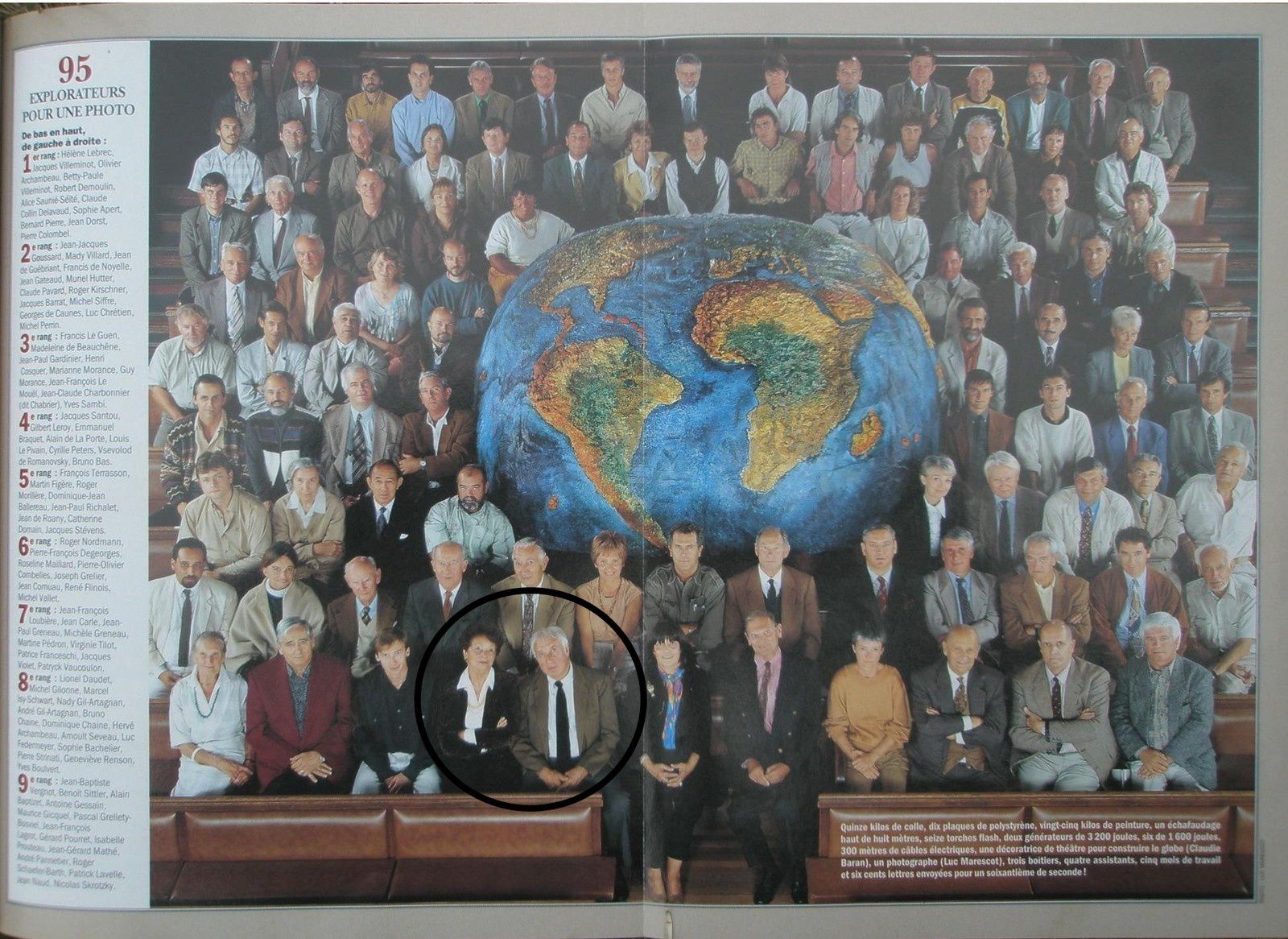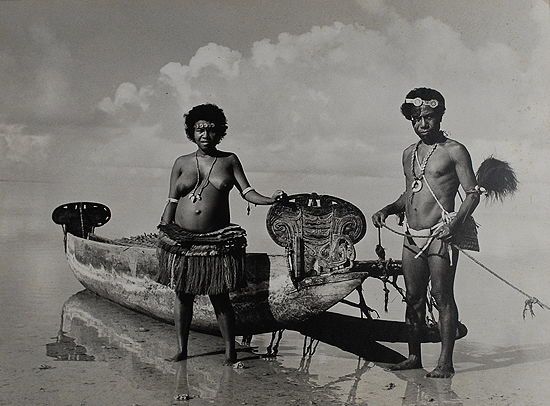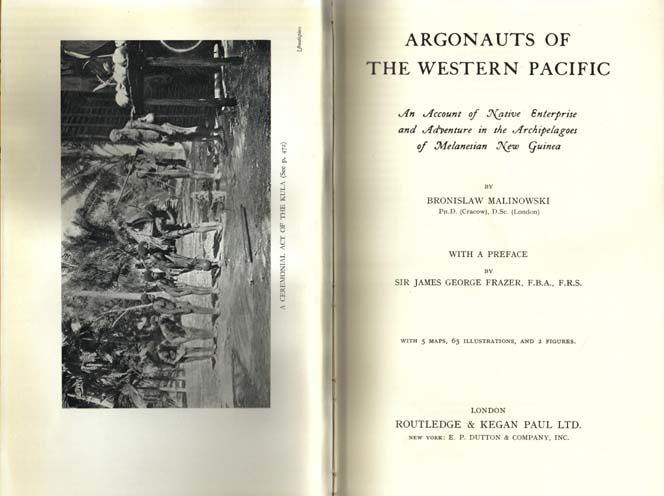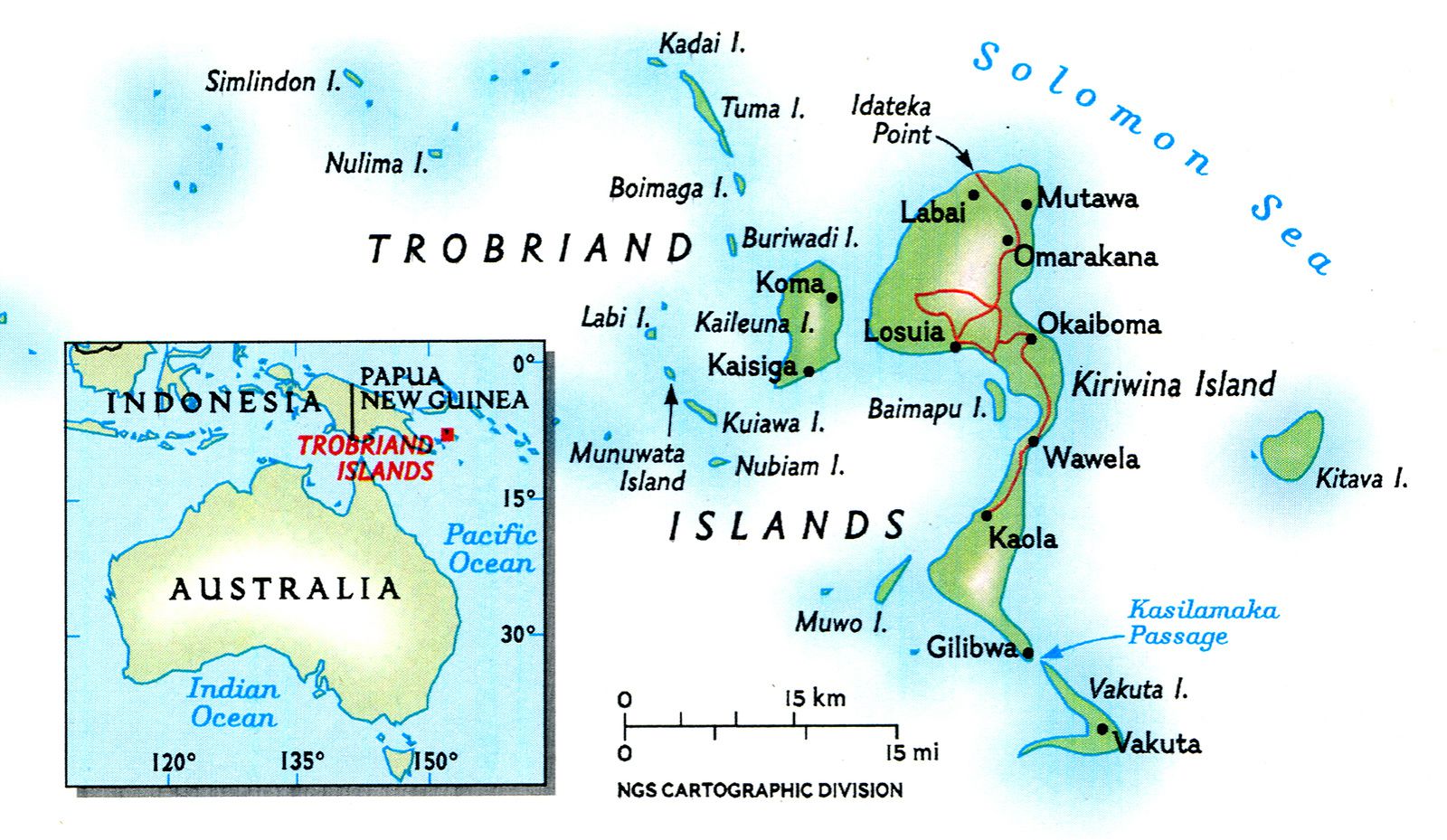j. et b. villeminot
Le paradis perdu des îles Trobriand, par Jacques et Betty Villeminot
"Aux Trobriand, on retrouve comme partout en Océanie l'histoire de la Terre-mère en fait. La Terre-mère agit comme un humain et le premier shaman est sorti de terre. Il est sorti de terre avec la connaissance de la magie. Donc c'est l'homme du monde invisible, c'est l'intermédiaire entre les vivants et les morts. Les chefs sont plus tard dans la société trobriandaise qui a été formée par des migrations successives (....). Mais en fait le magicien a toujours été l'homme fort." (NDLR: voir annexe infra).
"Tous les Trobriandais sont connus pour leur talent dans les poésies, qu'elles soient amoureuses ou au contraire des grandes histoires d'aventures maritimes et on les appelle "Les bardes des Mers du sud".
Betty Villeminot
* Infra à ce sujet l'extrait de la préface de Frazer au livre de B. Malinovski: Argonauts of the Western Pacific.
Le 60e anniversaire du Club des Explorateurs en 1995. Revue Grands Reportages. Photo par Alain Rastoin. Jacques et Betty Villeminot sont au premier rang en bas, dans un cercle noir. Pour ma part, je suis au 6e rang en partant d'en bas, le 4e en partant de la gauche, en pull bleu, contre la mappemonde.
On ne peut parler des îles Trobriand sans évoquer Bronislaw Malinowski (1884-1942), le fameux anthropologue, ethnologue et sociologue polonais (1884-1942) qui y séjourna entre 1915 et 1918 et étudia les moeurs de ses habitants, qu'il décrivit dans plusieurs ouvrages, comme Les Argonautes du Pacifique occidental (1922).
Invité par Pierre Sabbagh dans son émission Le Magazine des Explorateurs le 4 novembre 1967, Jacques Villeminot commence par situer les îles Trobriand et évoque la figure de Bronislaw Malinovski: https://www.ina.fr/video/CPF86610456
ANNEXE: Extrait de la préface de F.G. Frazer au livre de Bronislaw Malinovski: Argonauts of the Western Pacific (1922)
(...) Not the least interesting and instructive feature of the Kula, as it is described for us by Dr. Malinowski, is the extremely important part which magic is seen to play in the institution. From his description it appears that in the minds of the natives the performance of magical rites and the utterance of magical words are indispensable for the success of the enterprise in all its phases, from the felling of the trees out of which the canoes are to be hollowed, down to the moment when, the expedition successfully accomplished, the argosy with its precious cargo is about to start on its homeward voyage. And incidentally we learn that magical ceremonies and spells are deemed no less necessary for the cultivation of gardens and for success in fishing, the two forms of industrial enterprise which furnish the islanders with their principal means of support; hence the garden magician, whose business it is to promote the growth of the garden produce by his hocus-pocus, is one of the most important men in the village, ranking next after the chief and the sorcerer. In short, magic is believed to be an absolutely essential adunct of every industrial undertaking, being just as requisite for its success as the mechanical operations involved in it, such as the caulking, painting and launching of a canoe, the planting of a garden, and the setting of a fish-trap. „A belief in magic”, says Dr. Malinowski, „is one of the main psychological forces which allow for organisation and systematisation of economic effort in the Trobriands”.
This valuable account of magic as a factor of fundamental economic importance for the welfare and indeed for the very existence of the community should suffice to dispel the erroneous view that magic, as opposed to religion, is in its nature essentially male- ficent and anti-social, being always used by an individual for the promotion of his own selfish ends and the injury of his enemies, quite regardless of its effect on the common weal. No doubt magic may be so employed, and has in fact probably been so employ- ed, in every part of the world; in the Trobriand Islands themselves it is believed to be similarly practised for nefarious purposes by sorcerers, who inspire the natives with the deepest dread and the most constant concern. But in itself magic is neither beneficent nor maleficent; it is simply an imaginary power of controlling the forces of nature, and this control may be exercised by the magician for good or evil, for the benefit or injury of individuals and of the community. In this respect, magic is exactly on the same footing with the sciences, of which it is the bastard sister. They, too, in themselves, are neither good nor evil, though they become the source of one or other according to their application. It would be absurd, for example, to stigmatise pharmacy as antisocial, because a knowledge of the properties of drugs is oen employed to destroy men as well as to heal them. It is equally absurd to neglect the beneficent application of magic and to single out its maleficent use as the characteristic property by which to define it. The processes of nature, over which science exercises a real and magic an imaginary control, are not affected by the moral disposition, the good or bad intention, of the individual who uses his knowledge to set them in motion. The action of drugs on the human body is precisely the same whether they are administered by a physician or by a poiso- ner. Nature and her handmaid Science are neither friendly nor hostile to morality; they are simply indifferent to it and equally ready to do the bidding of the saint and of the sinner, provided only that he gives them the proper word of command. If the guns are well loaded and well aimed, the fire of the battery will be equally destructive, whether the gunners are patriots fighting in defence of their country or invaders waging a war of unjust aggression. The fallacy of differentiating a science or an art according to its application and the moral intention of the agent is obvious enough with regard to pharmacy and artillery; it is equally real, though to many people apparently it is less obvious, with regard to magic.
The immense influence wielded by magic over the whole life and thought of the Trobriand Islanders is perhaps the feature of Dr. Malinowski’s book which makes the most abiding impression on the mind of the reader. He tells us that „magic, the attempt of man to govern the forces of nature directly by means of a special lore, is all-pervading and all-important in the Trobriands’’; it is „interwoven into all the many industrial and communal activities”; „all the data which have been so far mustered disclose the extreme importance of magic in the Kula. But if it were a questions of treating of any other aspect of the tribal life of these natives, it would also be found that, whenever they approach any concern of vital importance, they summon magic to their aid. It can be said without exaggeration that magic, according to their ideas, governs human destinies; that it supplies man with the power of mastering the forces of nature; and that it is his weapon and armour against the many dangers which crowd in upon him on every side”.
Thus in the view of the Trobriand Islanders, magic is a power of supreme importance either for good or evil; it can make or mar the life of man; it can sustain and protect the individual and the community, or it can injure and destroy them. Compared to this universal and deep-rooted conviction, the belief in the existence of the spirits of the dead would seem to exercise but little influence on the life of these people. Contrary to the general attitude of savages towards the souls of the departed, they are reported to be almost completely devoid of any fear of ghosts. They believe, indeed, that the ghosts return to their villages once a year to partake of the great annual feast; but „in general the spirits do not influence human beings very much, for better or worse”; „there is nothing of the mutual interaction, of the intimate collaboration between man and spirit which are the essence of religious cult. This conspicuous predominance of magic over religion, at least over the worship of the dead, is a very notable feature in the culture of a people so comparatively high in the scale of savagery as the Trobriand Islanders. It furnishes a fresh proof of the extraordinary strength and tenacity of the hold which this world-wide delusion has had, and still has, upon the human mind.
We shall doubtless learn much as to the relation of magic and religion among the Trobrianders from the full report of Dr. Malinowski’s researches in the islands. From the patient observation which he has devoted to a single institution, and from the wealth of details with which he has illustrated it, we may judge of the extent and value of the larger work which he has in preparation. It promises to be one of the completest and most scientific accounts ever given of a savage people.
J.G. Frazer

/image%2F0662944%2F20170313%2Fob_3490fc_poc-grands-reportages-nov-99.jpg)







